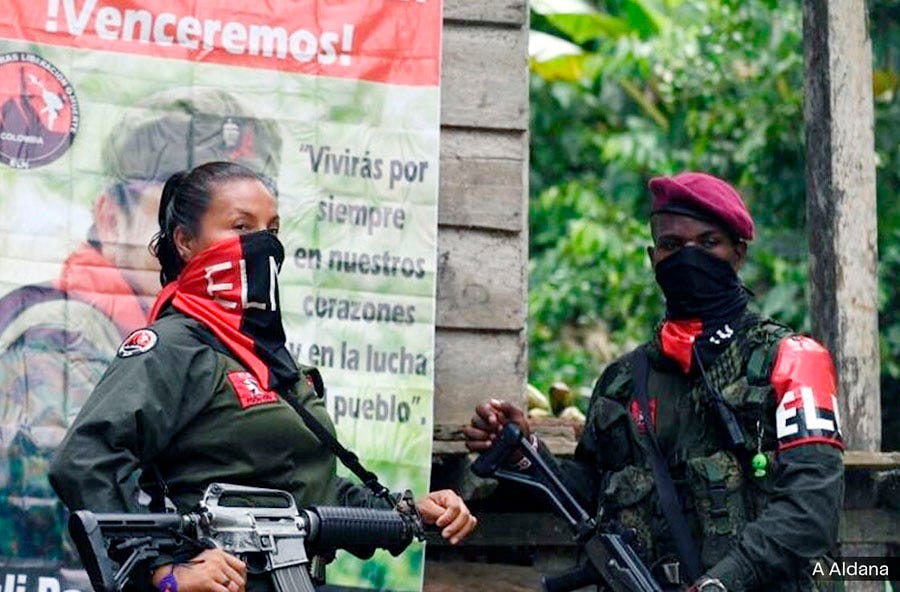ELN is back at war in the Venezuelan-Colombian borderlands
A brazen daytime robbery of more than half a million dollars turned into a shootout with police. It's merely the latest in a series of attacks since the ceasefire collapse

On Friday, November 23, an armored SUV was transporting 2.7 billion Pesos (around $600,000 USD) under police escort from the town of Convención, in the Catatumbo sub-region of Norte de Santander, in eastern Colombia near the Venezuelan border, when it was intercepted by armed men driving a van.
The thieves, accused of being members of the country’s largest remaining rebel group the National Liberation Army (ELN by its Spanish initials) engaged in a running gunfight with the police escorts.
A military unit responded quickly to the shootout and arrived to reinforce beleaguered police, one of whom had been wounded by their ambushers, but the armed men were able to secure the money and flee the scene amidst the firefight.
Colombia’s Ministry of Defense released a statement shortly afterward blaming ELN for the attack, and the wounded officer. The attack was a daring and well-planned daytime robbery that intercepted the private security cash transport vehicle before it reached its destination— a nearby military base where the money shipment was scheduled to be airlifted to the city of Cucuta.
The robbery is news in and of itself, but it is merely a small piece of a much larger story: the massive escalation of violence committed by ELN in Catatumbo since the collapse of a formal ceasefire with the government on August 3.
ELN is now fighting a two-front war in the Venezuelan-Colombian borderlands: one against the State, and a second against Colombia’s largest and fastest-growing criminal group, the Gaitanista Army of Colombia (EGC), also called the ‘Gulf Clan’ by police.
Warfront Number 1: The Colombian State
Leftist President Gustavo Petro has promised to bring what he calls “Total Peace” to a country plagued by more than half a century of conflict via negotiations with armed criminal groups. So far, however, he has made little progress.
After a series of early errors and setbacks, including the announcement by the government of a supposedly bilateral ceasefire with ELN that the rebel group quickly denied having any part of, Petro’s negotiators finally managed to initiate formal talks with the rebel group in 2023.
A 6-month ceasefire in June of that year was hailed as a political victory by the Petro administration and was extended for another 6 months as talks continued. Catatumbo, large regions of which are effectively controlled by the armed group, entered a “tense calm”, according to residents at the time, and violence dropped.
The deal, however, collapsed after it was not renewed amidst a series of sharp disagreements between the two parties this past August.
Petro officially resumed military operations against the group after ELN launched a rocket attack on a military barracks in the department of Arauca, also near the Venezuelan border, in mid-September. The attack killed 2 soldiers and wounded 27 more.
“An explosive-filled truck injured 27 young soldiers and killed two. It was placed by the ELN, with whom we were discussing peace,” at a military base, said Petro shortly after the attack in public statements. “This is an action that ends a peace process by blood.”

ELN, however, claims that the government was acting in bad faith.
“This government has been characterized by having several matrices, several faces,” said Israel Ramírez, alias ‘Pablo Beltrán’, lead negotiator for the ELN, in an interview on November 18.
He accuses the government of breaking agreements between the two groups, including parallel negotiations with supposed breakaway groups within the rebel organization.
“If there is non-compliance with previous agreements, obviously we don't have much motivation to sign new agreements. That's where we are,” he said
The government also faulted ELN’s continued kidnapping-for-ransom activities as a means of financing, forced recruitment of minors in the regions it controls, and procedural problems at the negotiating table for the scuttled truce.
After a message from Beltran inviting Petro to a new round of talks on November 10, Petro seemingly showed a willingness to re-open negotiations.
“If the ELN is willing to cease fire and every agreement is fulfilled immediately in favor of the people of the regions that suffer the conflict, I accept,” Petro wrote Saturday on Twitter.
In the meantime, at least in Catatumbo, the ELN seems to be using asymmetrical attacks on military forces to pressure the government and demonstrate its operational capabilities at the same time as it fends off aggression by EGC, who seem determined to muscle into the region.
Catatumbo has long been a battleground for armed groups
The ELN arrived to Catatumbo in the 80’s, drawn in part by a complete absence of state presence. The region’s proximity to Venezuela, mountainous jungle terrain, and excellent agricultural potential have long presented strategic advantages to left-wing rebel groups.
The Revolutionary Armed Forces of Colombia (FARC) also maintained a strong presence in the sub-department, at times even clashing with the ELN for territorial control.
The region also boasts considerable oil wealth. In Tibú, the unofficial capital of Catatumbo, the government attempted to encourage multinational oil companies to exploit these reserves 1950s. By the 60s, however, a plethora of left-wing rebel groups who opposed such activity made security conditions impossible for the private sector to operate.
By the 90s, infamous right-wing death squads, hunting rebels and activists alike, also arrived to the region with an interest in taking it for themselves. In 1999, the United Self-Defense Forces of Colombia (AUC), a coalition of paramilitary forces with a horrific record of human rights abuses announced their arrival with massacres of civilian populations in La Gabarra and Tibú.
The borderlands quickly became a battlefield replete with gruesome acts of paramilitary horror, such as the crematorium ovens of Juan Frio where Jorge Iván Laverde, alias “El Iguano”, incinerated more than 300 people to hide their bodies. In January of this year, more than 4,000 anonymous bodies found in the central cemetery of Cúcuta were exhumed. The vast majority correspond to people reported missing between 1998 and 2005 on the border.
The EGC is an ideological descendant of the groups that committed these acts of brutality. All of its current leadership were once AUC commanders.
By the early 2000s, Catatumbo had also become the second-largest coca-producing region in the country. Coca is the raw ingredient in cocaine production. Colombia produces more cocaine than any other country in the world.
It is so prevalent, that farmers do not even attempt to hide their crops. Pirate Wire Services, in multiple field research trips to the region, has witnessed evidence of clashes between EGC and ELN forces, particularly in western Catatumbo, near the neighboring department of Cesar, which has long been a bastion of paramilitary presence, and near Cucuta— the largest city on the Venezuelan border.


Fighting has increased not just between ELN and security forces in recent months, but between EGC and ELN as well, according to Pares, an investigative non-profit that researches peace-building in the country.
Both groups have been involved in off-and-on talks with the government and seem to be attempting to consolidate their positions territorially, financially, and tactically, as part of an ever-changing set of dynamics with the government.
In the meantime, the shadow war in the borderlands has come out of the shade and into plain view.

The Big Headlines in LATAM
Brazil has formally accused ex-president Jair Bolsonaro and some of his closest associates with plotting a coup in the wake of his losing 2022 election bid.
After a two-year investigation, police said their probe "found the existence of a criminal organization that acted in a coordinated manner, in 2022, in an attempt to keep the then president of the republic in power", and announced the indictment of the 37 people, including the ex-President as part of new charges.
In Nicaragua, legislators from seemingly-lifetime-president Daniel Ortega’s political party have granted exceptional new powers to the leader, as well as to his wife, Rosario Murillo.
Ortega has been abandoned even by once-allies for crackdowns on opposition parties, journalists, and activists, as well as sham elections. The new powers grant broad powers to Nicaragua’s executive branch over journalism in the country, extend the length of a presidential term, and formally enshrine Murillo to the post of “co-president”.
The Spanish Word of the Week
lagartear- uh….we’re gonna have to explain this one. There is no direct English translation.
Lagarto means “lizard” in English, and lagartear is a verbified version of that noun. We suppose technically it could be translated as “to lizard” or “lizarding”, but that probably doesn’t help you understand it much.
Joshua first heard the term in Cali, as hundreds of politicians shook hands, cut backroom deals, and per firsthand PWS observations, even hob-knobbed with the city’s famous (and wealthy) criminal class.
At one point, he excused himself to go the bathroom and when he returned, the politician he had been talking to had disappeared. Joshua asked his companion where the Bogota councilman had gone to, and was told:
“Ah se fue. Está lagarteando” — “He left. He’s lizarding.”
After a very, very confused moment in which Joshua thought he might he warming himself in the sun atop a large seaside rock, his companion explained to him that lagartear is effectively all the slimy shit politicians have to do to remain in office — cutting backroom deals, meeting with the shadier elements of society, making promises they have no intention of keeping, and, presumably, soliciting bribes.
And thus Joshua learned a new slang term, showing once again the dynamic nature of Spanish verbs. Having a few thousand more than in English simply isn’t enough. They have to keep inventing new ones!
Hasta pronto, piratas!



